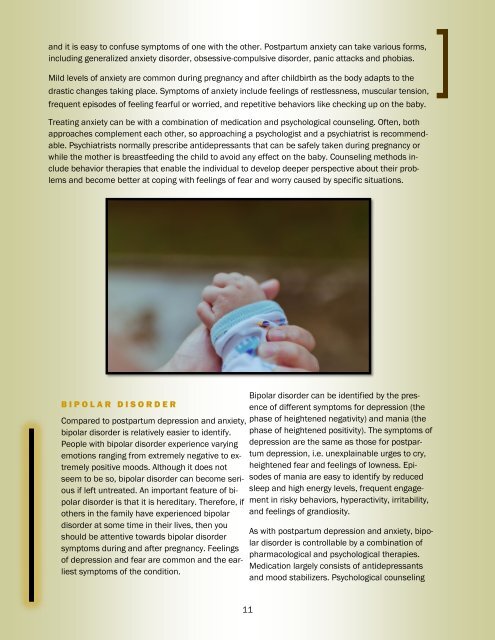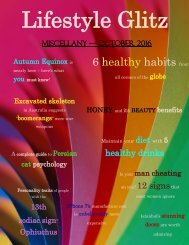Lifestyle Glitz - September Tranquility 2016
This is a Lifestyle Magazine by www.LifestyleGlitz.com, September 2016 Edition. Enjoy it!
This is a Lifestyle Magazine by www.LifestyleGlitz.com, September 2016 Edition. Enjoy it!
You also want an ePaper? Increase the reach of your titles
YUMPU automatically turns print PDFs into web optimized ePapers that Google loves.
and it is easy to confuse symptoms of one with the other. Postpartum anxiety can take various forms,<br />
including generalized anxiety disorder, obsessive-compulsive disorder, panic attacks and phobias.<br />
Mild levels of anxiety are common during pregnancy and after childbirth as the body adapts to the<br />
drastic changes taking place. Symptoms of anxiety include feelings of restlessness, muscular tension,<br />
frequent episodes of feeling fearful or worried, and repetitive behaviors like checking up on the baby.<br />
Treating anxiety can be with a combination of medication and psychological counseling. Often, both<br />
approaches complement each other, so approaching a psychologist and a psychiatrist is recommendable.<br />
Psychiatrists normally prescribe antidepressants that can be safely taken during pregnancy or<br />
while the mother is breastfeeding the child to avoid any effect on the baby. Counseling methods include<br />
behavior therapies that enable the individual to develop deeper perspective about their problems<br />
and become better at coping with feelings of fear and worry caused by specific situations.<br />
B I P O L A R D I S O R D E R<br />
Compared to postpartum depression and anxiety,<br />
bipolar disorder is relatively easier to identify.<br />
People with bipolar disorder experience varying<br />
emotions ranging from extremely negative to extremely<br />
positive moods. Although it does not<br />
seem to be so, bipolar disorder can become serious<br />
if left untreated. An important feature of bipolar<br />
disorder is that it is hereditary. Therefore, if<br />
others in the family have experienced bipolar<br />
disorder at some time in their lives, then you<br />
should be attentive towards bipolar disorder<br />
symptoms during and after pregnancy. Feelings<br />
of depression and fear are common and the earliest<br />
symptoms of the condition.<br />
Bipolar disorder can be identified by the presence<br />
of different symptoms for depression (the<br />
phase of heightened negativity) and mania (the<br />
phase of heightened positivity). The symptoms of<br />
depression are the same as those for postpartum<br />
depression, i.e. unexplainable urges to cry,<br />
heightened fear and feelings of lowness. Episodes<br />
of mania are easy to identify by reduced<br />
sleep and high energy levels, frequent engagement<br />
in risky behaviors, hyperactivity, irritability,<br />
and feelings of grandiosity.<br />
As with postpartum depression and anxiety, bipolar<br />
disorder is controllable by a combination of<br />
pharmacological and psychological therapies.<br />
Medication largely consists of antidepressants<br />
and mood stabilizers. Psychological counseling<br />
11






